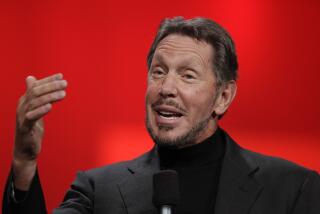Pool Firm’s Founder Now Its Rival : Retail: Smarting from a leveraged buyout, the onetime co-owner of a leading specialty chain is challenging the company that bears his name.
- Share via
Leslie’s Poolmart, the nation’s biggest specialty retailer of swimming pool supplies, is planning to go public. But as the Chatsworth-based company prepares its initial offering of stock, its namesake, Philip L. Leslie, is making waves.
Leslie’s Poolmart operates 85 stores in 20 states, and had sales of $65 million last year. The company was co-founded by Leslie in 1963, and he ran the company until 1988, when he sold his 50% stake in the business to an investor group, Hancock Park Associates, that purchased all of Leslie’s in a $17.5-million leveraged buyout.
Leslie, 56, says he didn’t want to sell. But the company’s other half-owner, Raymond Cesmat, did. Cesmat was able to get a state court to order the partnership sold, which is possible in California if the two partners can’t agree to terms. At one point in the dispute, in May 1988, Cesmat and a court-appointed director fired Leslie on grounds he was intentionally interfering with the buyout.
Many of the company’s employees were angry that Leslie was ousted. For three weeks most failed to show up for work, effectively shutting down more than 60 of Leslie’s stores. They picketed the Glendale headquarters of Glendale Federal Bank, which made the loan to Hancock Park. There also was a flurry of lawsuits between the parties.
Eventually all were settled, however, and Leslie’s was sold to the Hancock Park group.
But Phil Leslie, despite getting $9 million for his half after he and Cesmat founded the company with only $3,000 each, is still bitter about the sale. “I didn’t want to sell the company, and I sold for too low a price,” he said. “My whole posture the whole time was, ‘I’m not for sale.’ ”
So he’s trying to get even.
Two days after leaving Leslie’s Poolmart--which was then named Leslie’s Swimming Pool Supplies--Leslie bought half of Sandy’s Pool Supply, a North Hollywood-based retailer, from owner Sandy Bass for $500,000.
At the time Sandy’s had only two stores. But since Leslie arrived--bringing with him several former Leslie’s managers--he’s expanded Sandy’s to 21 stores in five states and established a mail-order division. When he left Leslie’s, as is customary, Phil Leslie signed an agreement not to compete. But it was a fairly lax agreement, and according to the deal, Phil Leslie is free to open a rival store so long as it’s at least half a mile away from any Leslie’s store.
Sandy’s still pales in size next to Leslie’s, with only one-fourth as many stores and $16 million in sales. But Phil Leslie asserted that Sandy’s is now Leslie’s strongest competitor and “can grow to $100 million a year” in sales. Also, Phil Leslie owns four properties where Leslie’s Poolmart leases store space, including outlets in San Antonio and St. Louis. When those leases expire, Leslie’s “will be thrown out” and Sandy’s will move in, Phil Leslie said.
Leslie’s current chairman, Michael J. Fourti, who led the buyout group, declined to comment much beyond what is already in Leslie’s stock-registration filing with the Securities and Exchange Commission. He cited SEC rules that prohibit an executive of a company in registration from saying anything that might be construed as touting the stock.
He did term Sandy’s “a knowledgeable and aggressive competitor” but did not want to elaborate.
Regardless, Leslie’s Poolmart isn’t treading water in an industry that serves about 3.3 million residential in-ground swimming pools, 3.3 million above-ground residential pools, 500,000 commercial pools and 2 million spas and hot tubs, according to Leslie’s SEC filing.
Leslie’s, with 460 full-time employees and nearly 200 part-time workers in the summer, has added 17 stores since Phil Leslie was ousted and expects to open an additional 25 outlets next year. Meanwhile, it plans to go public with the sale of 1.9 million common shares of stock expected to sell for between $9 and $10.50 apiece, providing the company with about $20 million.
The money will go toward paying off Leslie’s $21-million bank debt, most of which was incurred by Hancock Park in order to purchase the company. In a leveraged buyout, a group buys a company with mostly borrowed funds that are secured by the target company’s assets.
By paying off the debt, Leslie’s also would take a major step toward ending its recent string of losses. Last year, the company lost $1.1 million, mainly because it had $3.3 million in debt-interest expenses. In this year’s first quarter--seasonally a poor quarter for pool supplies--Leslie’s lost $2.7 million on sales of $9 million.
(Chlorine and other pool chemicals account for nearly half of Leslie’s sales. Leslie’s buys the chemicals in bulk and repackages them into various-size containers for its customers.)
And as is common with successful leveraged buyouts, the investors stand to profit enormously by later selling stock in the company to the public. Hancock Park, led by Fourti, put up $1.8 million of its own money to make the purchase. The group now plans to sell nearly 500,000 of its Leslie’s shares in the public offering, which at $10 a share would provide it with $5 million.
More to Read
Inside the business of entertainment
The Wide Shot brings you news, analysis and insights on everything from streaming wars to production — and what it all means for the future.
You may occasionally receive promotional content from the Los Angeles Times.











